What your Facebook updates say about your age
By analyzing Facebook posts, a new study uncovers which words best distinguish age groups from each other


A free daily email with the biggest news stories of the day – and the best features from TheWeek.com
You are now subscribed
Your newsletter sign-up was successful
For a long time, psychologists have studied how the words people use correlate with characteristics like gender, personality type and age. They would answer questions like "do older people use more positive words than younger people?" by making lists of words they deemed positive or negative and then counting them up in language samples given by people from different age groups. Now, researchers have come up with a new way of looking at the relationship between language and social characteristics, in which the differences between groups are suggested by the data itself, and not by the researchers. Instead of asking whether characteristics (young, old) correlate with words (positive, negative), it asks which words best distinguish these groups from each other?
The technique allows you to find differences you may not have even thought of. But its sophisticated statistical algorithms require massive quantities of text. A recent study by H. Andrew Schwartz and colleagues at the Positive Psychology Center of the University of Pennsylvania and the Psychometrics Centre at the University of Cambridge analyzed 15.4 million Facebook messages from 75,000 volunteers who provided information about their gender, age and personality type (in the form of a standard personality test). As might be expected from Facebook messages, some of the researchers' findings below cite a lot of profanity.
Among the insights uncovered were a strong correlation between introversion and Japanese media ("anime," "manga," "pokemon") and a stronger tendency for males to say "my girlfriend/wife" than for females to say "my boyfriend/husband."
The Week
Escape your echo chamber. Get the facts behind the news, plus analysis from multiple perspectives.

Sign up for The Week's Free Newsletters
From our morning news briefing to a weekly Good News Newsletter, get the best of The Week delivered directly to your inbox.
From our morning news briefing to a weekly Good News Newsletter, get the best of The Week delivered directly to your inbox.
With respect to age, the major concerns of each life stage, unsurprisingly, are represented in the words people use at those stages. These word clouds show the words used in four different age groups. Unlike most word clouds, the size of the word doesn't indicate how frequent that word is. Rather, it shows how well that word distinguishes that age group from the others. So four life stages might be summed up like this:
13-18: emoticons, school, homework19-22: profanity, campus, semester, 21st23-29: at_work, days_off, office, beer, wedding30-65: family and friends, daughter, son, kids, repost, copy_and
High school kids are talking about school, college kids are swearing and talking about their 21st birthdays, young adults are talking about work, weddings and beer, and older adults are talking about family and forwarding those "please repost" and "copy and paste" Facebook messages.
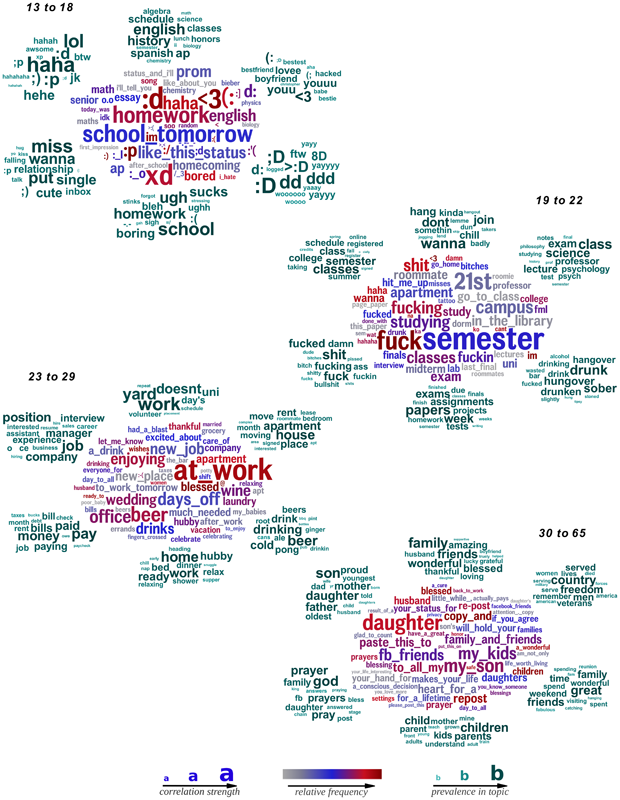
Via study
Other graphs tell different types of stories. These plots of the frequency of certain types of words show how negativity seems to decrease with age while positivity increases (confirming previous research on the age-related positivity effect) and how people use "I" less and "we" more as they get older (indicating an increasing focus on social relationships).
A free daily email with the biggest news stories of the day – and the best features from TheWeek.com
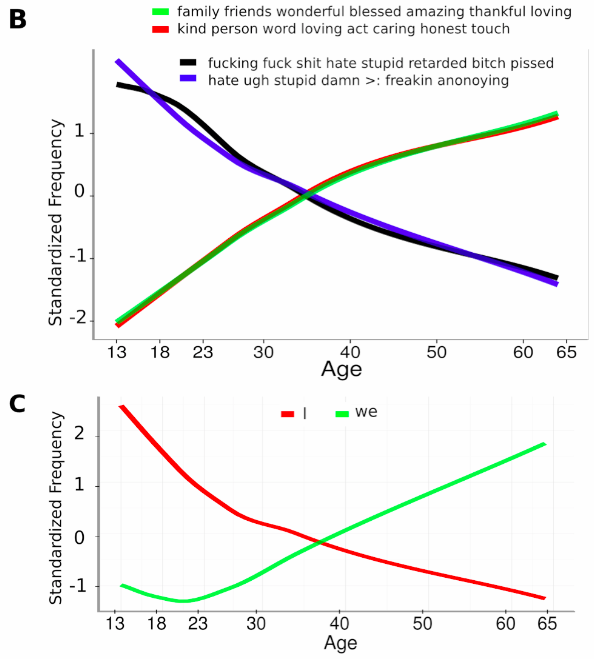
Via study
You can explore the age data yourself at the World Well-Being Project site, where you can generate a plot for words of your choice. Here are a few that I tried:
FOR BABY, CAT, AND DOG
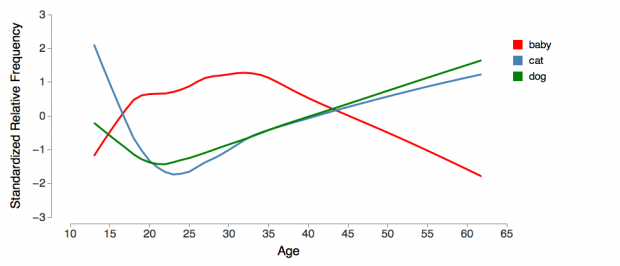
Looks like pets get a bum deal during the baby-making years, but they get the attention back once the kids are older.
FOR WHO, WHAT, WHERE, WHEN, WHY, AND HOW
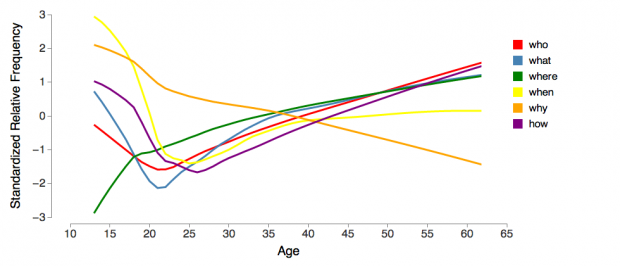
Most question words cluster together with big dip in the 20's. But "why" and "where" break the pattern. Do 20-somethings think they know everything except why? Do people worry more about the facts and less about the reasons as they get older? Why do they stop asking why? Do teenagers not care about where things are happening until they start driving? Are older people forgetting where they left their car keys?
FOR SUCKS VS. BUMMER
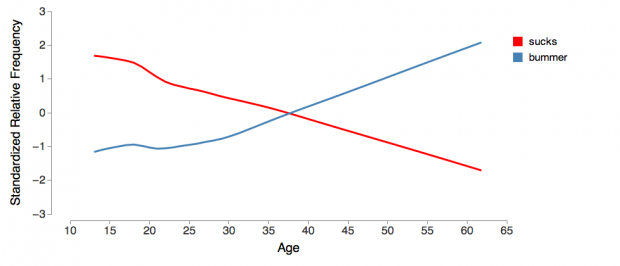
The use of anything with a touch of profanity goes down with age, but slang doesn't necessarily decrease. I thought "bummer" was a young person's word. Guess I'm showing my age.
FOR PICS VS. PIX
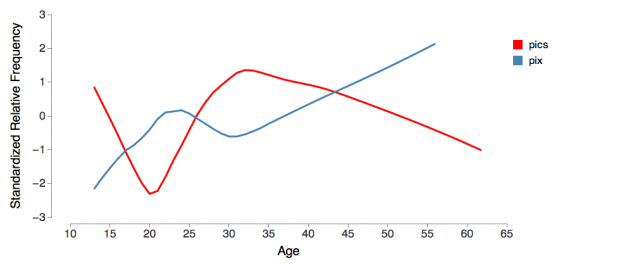
Pics at 13, pix at 20, pics at 30, pix at 50. Artifact of people not really settling on one or the other? Or something else? I prefer pics, but it looks like my preferences may soon change.
Arika Okrent is editor-at-large at TheWeek.com and a frequent contributor to Mental Floss. She is the author of In the Land of Invented Languages, a history of the attempt to build a better language. She holds a doctorate in linguistics and a first-level certification in Klingon. Follow her on Twitter.
-
 Switzerland could vote to cap its population
Switzerland could vote to cap its populationUnder the Radar Swiss People’s Party proposes referendum on radical anti-immigration measure to limit residents to 10 million
-
 Political cartoons for February 15
Political cartoons for February 15Cartoons Sunday's political cartoons include political ventriloquism, Europe in the middle, and more
-
 The broken water companies failing England and Wales
The broken water companies failing England and WalesExplainer With rising bills, deteriorating river health and a lack of investment, regulators face an uphill battle to stabilise the industry
